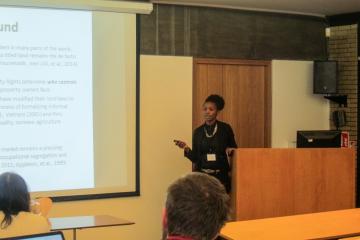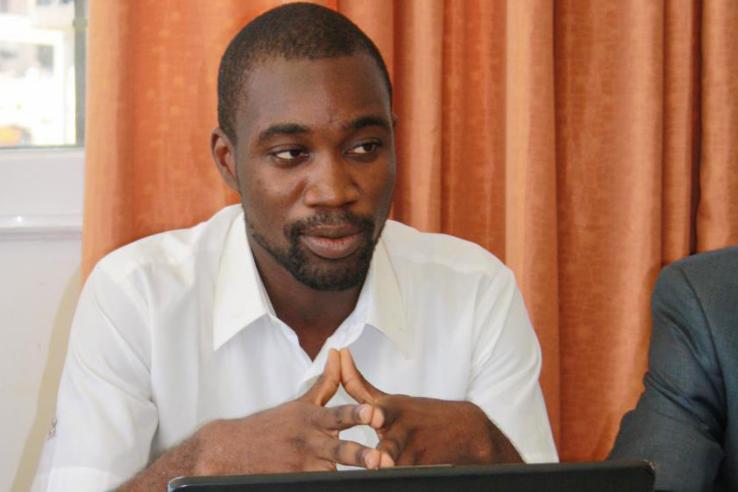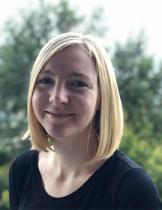
African Scholar Spotlight: Kodjo Aflagah

The African Scholars Spotlight series highlights the work and journey of economists from the African continent who are working on issues of poverty and using experimental methods.
Dr. Kodjo Aflagah joined the J-PAL Teaching at the Right Level and Digital Identification and Finance Initiative teams, having just completed his PhD in economics at the University of Maryland. Hailing from Togo, Kodjo holds a BS in Mathematics from the University of Lome as well as a MA In Economics and Statistics from ENSAE in Senegal. His fields of specialization include development economics and applied econometrics, with a particular interest in labor markets and agriculture in developing countries.
Could you tell us a bit about your career aspirations and why you want to pursue a career in academia?
One can impact people’s lives either through direct action on the ground or by helping produce knowledge around effective interventions. I would be interested in the long run in a career in the implementation space, but for now I feel I will make a greater contribution building the body of knowledge around policy evaluation.
I value the freedom granted in academia, where I am not constrained by specific ways of thinking or limited to particular topics of investigation. Teaching is also a major passion of mine and one of the main ways in which I try to give back. I’ve been tutoring high school students since my days as an undergraduate student, so I’m really excited about opportunities to teach going forward.
What drew you into the field of development economics and in particular, working with impact evaluations?
I found my undergraduate studies in mathematics interesting but abstract, and was looking for something more applicable to the world around me. I thus slowly made the transition from math to statistics and eventually into economics.
Economics offers interesting tools to explore human behavior and the ways in which it could be influenced for good. Microeconomic theory in particular, with its focus on incentives, caught my attention. I inevitably ended up in development economics as it allows me to apply microeconomic theory to questions I think are important, and particularly relevant for contexts similar to the one I grew up in. Impact evaluations are really an extension of this—being one of the best available tools for exploring such questions—so it made sense to engage with them more fully.
What has the path to an academic career been like for you? Were there any challenges you faced along the way?
One of the biggest challenges I’ve grappled with is learning to ask for help. University systems, and in fact the whole education system in Francophone Africa, emphasize the importance of figuring things out by yourself, and you do not get access to teachers as one does in the US. Learning to reach out to advisors or asking colleagues for feedback has been a big shift for me.
A PhD can be a very lonely and isolating experience that can negatively impact one's mental health. This will be particularly true for Africans in western universities. I had to adapt to a new culture (especially my first time being in a country where I am in the minority group), and a new education system. That said, friends who chose to go into Canadian universities for their PhD had a different experience: there are usually many in their cohorts that know each other, and this eases the transition into the new system.
Another important challenge was funding and supporting myself during the PhD. I was fortunate to secure a teaching assistantship but my last year was extremely challenging, as I was no longer funded. The last summer of my PhD, I was writing my job market paper, doing some consultancy work to fund my last year, and figuring out visa requirements for jobs outside the US—all at the same time. You need to be very proactive to protect your research time and not fall behind.
What or whom had the most impact on your career journey so far?
First, the training I received at ENSAE in Senegal ensured I was adequately prepared for the rigorous demands of PhD quantitative coursework. It instilled in me a strong work ethic and I doubt I would have made it here today without having attended that school.
Before and at the start of my graduate studies, talking to people about the real experience of completing a PhD was incredibly important. The feedback I got about long working hours, limited personal time, loss of income, etc. enabled me to properly evaluate whether the sacrifices were worth it.
My research assistant experience helped develop relevant skills and secure strong references for graduate school applications. I owe a great deal to my supervisors, Tanguy Bernard and Angelino Viceisza, who introduced me to mentors such as Susan Godlonton and who guided me through PhD application processes. Moussa Blimpo, a fellow Togolese economist, has also always made time for me and provided me with very valuable advice.
Finally, I had an amazing PhD supervisor, Jessica Goldberg, who understood the challenges that international students face in the US and worked to ensure these didn’t negatively impact my academic experience by encouraging me to come out of my shell, ask more questions, and engage with my professors.
Do you have advice to offer other young aspiring African scholars thinking about a career in economic research?
Don’t be afraid to engage with other scholars—particularly those who are also from Africa—around their experiences. You do not have to figure everything out on your own and people are more than happy to engage with you, as long as you are mindful of their time. They can often point you in the direction of useful information, opportunities, and interesting people! Social media can be a trove of information, particularly Twitter, where economists often share useful information for aspiring PhD applicants. Someone like Dina Pomeranz is fantastic.

